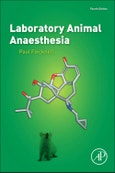Laboratory Animal Anaesthesia, Fourth Edition provides a basic guide to anaesthesia for a very diverse audience needing content, with straight-forward, structured style of writing. Updated with effects of anaesthetics in different laboratory species, including sources of dose rates will be incorporated into tabular material. New information on pain assessment and pain management will be covered, and an increased emphasis on rats and mice for anaesthesia and perioperative care. With newly revised, full color illustrations to facilitate best learning, Laboratory animal Anesthesia, Fourth Edition provides procedures, key points and invaluable advice from a well-known and respected veterinary anesthetist and scientist with over 30 years of experience in the field.
Please Note: This is an On Demand product, delivery may take up to 11 working days after payment has been received.
Table of Contents
1. Preparing for Anaesthesia 2. Managing and Monitoring Anaesthesia 3. Advanced and More Specialised Techniques 4. Analgesia and Post-Operative Care 5. Anaesthesia of Common Laboratory Species








